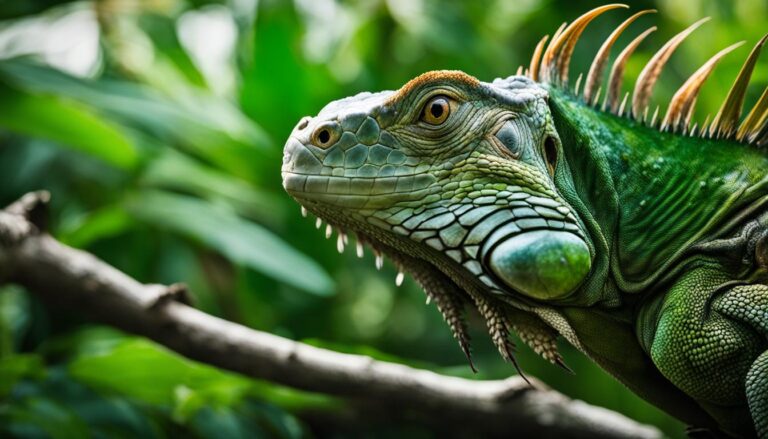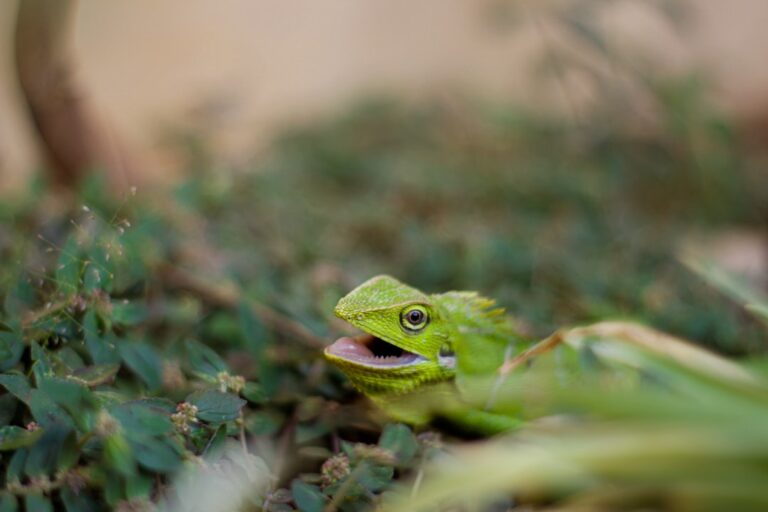Do Iguanas Smell Bad?
Iguanas are fascinating reptiles that are known for their unique appearance and behavior. One aspect of iguanas that often goes unnoticed is their scent. Understanding iguana scent is important for several reasons, including communication, territory marking, and mating. In this article, we will explore the role of scent in iguana behavior and discuss how to manage and cope with the smell associated with these reptiles.
Table of Contents
Understanding the Iguana’s Natural Scent
Scent plays a crucial role in iguana communication. Iguanas have a specialized organ called the Jacobson’s organ, located in the roof of their mouth, which allows them to detect and interpret scents in their environment. They use scent to communicate with other iguanas, marking their territory and attracting mates.
When an iguana marks its territory, it releases a combination of chemicals that create a unique scent. This scent serves as a warning to other iguanas that the area is already claimed and should be avoided. It also helps them identify individuals within their social group.
During mating season, male iguanas produce pheromones that attract females. These pheromones are released through specialized glands located on the sides of their body. The female iguanas can detect these pheromones and use them to identify potential mates.
The Role of Iguana Pheromones
Pheromones are chemical substances that are produced by animals to communicate with others of the same species. Iguanas use pheromones as a form of chemical communication, allowing them to convey information about their identity, reproductive status, and social hierarchy.
There are several types of pheromones produced by iguanas. The most well-known is the sex pheromone, which is released by male iguanas during mating season to attract females. This pheromone is detected by the female iguanas, who then follow the scent trail to find the male.
Iguanas also produce territorial pheromones, which are used to mark their territory and establish dominance. These pheromones are released through specialized glands located on the sides of their body. When another iguana encounters these pheromones, it knows to stay away from that area.
Factors that Affect Iguana Odor
Several factors can affect the odor of an iguana. One of the main factors is diet. Iguanas are herbivores and primarily eat fruits and vegetables. However, if they are fed a diet that is high in protein or contains certain foods with strong odors, it can affect their scent.
The environment in which an iguana lives can also impact its odor. If the enclosure is not properly cleaned and maintained, it can lead to a buildup of waste and bacteria, resulting in a strong smell. Additionally, if the enclosure is too humid or lacks proper ventilation, it can contribute to an unpleasant odor.
The health of an iguana can also play a role in its odor. If an iguana is suffering from a health issue, such as an infection or digestive problem, it can cause a change in its scent. It is important to monitor an iguana’s health and seek veterinary help if any concerning symptoms arise.
How to Identify a Smelly Iguana
It is important for iguana owners to be able to identify when their pet has a strong odor. Some signs of a smelly iguana include a strong musky smell, excessive droppings, and a dirty or unkempt appearance. It is important to note that all iguanas have a natural scent, but if the odor becomes overpowering or there are other concerning symptoms present, it may indicate an underlying issue.
Differentiating between normal and abnormal iguana odor can be challenging. Normal iguana odor is typically mild and musky, similar to the smell of fresh earth or vegetation. Abnormal odor, on the other hand, may be stronger and more pungent. It is important to pay attention to any changes in an iguana’s scent and seek veterinary help if necessary.
Common Causes of Iguana Odor
There are several common causes of iguana odor. One of the main causes is poor hygiene. If an iguana’s enclosure is not cleaned regularly or if the iguana is not bathed regularly, it can lead to a buildup of waste and bacteria, resulting in a strong smell.
Diet can also play a role in iguana odor. If an iguana is fed a diet that is high in protein or contains certain foods with strong odors, it can affect their scent. It is important to provide an iguana with a balanced diet that meets its nutritional needs.
Health issues can also contribute to iguana odor. If an iguana is suffering from an infection or digestive problem, it can cause a change in its scent. It is important to monitor an iguana’s health and seek veterinary help if any concerning symptoms arise.
Tips for Reducing Iguana Smell
There are several tips that can help reduce iguana smell. One of the most important tips is to properly clean the iguana’s enclosure. This includes removing waste regularly, cleaning surfaces with a reptile-safe disinfectant, and providing proper ventilation.
Providing an appropriate diet is also important for reducing iguana smell. Feeding an iguana a balanced diet that meets its nutritional needs can help prevent digestive issues and reduce odor.
Regular bathing can also help reduce iguana smell. Bathing an iguana in lukewarm water can help remove dirt and bacteria from its skin, reducing odor. It is important to use a reptile-safe shampoo or soap and to rinse the iguana thoroughly after bathing.
The Importance of Proper Iguana Hygiene
Proper iguana hygiene is crucial for preventing odor and maintaining the health of the reptile. Regular cleaning of the iguana’s enclosure is essential for removing waste and bacteria that can contribute to a strong smell. It is important to use a reptile-safe disinfectant and to provide proper ventilation in the enclosure.
Bathing an iguana regularly is also important for maintaining proper hygiene. Bathing helps remove dirt and bacteria from the iguana’s skin, reducing odor. It is important to use a reptile-safe shampoo or soap and to rinse the iguana thoroughly after bathing.
Regular veterinary check-ups are also important for maintaining proper iguana hygiene. A veterinarian can assess the iguana’s overall health and provide guidance on proper care and hygiene practices.
When to Seek Veterinary Help for Iguana Odor
While some odor is normal for iguanas, there are certain signs that may indicate an underlying health issue. If an iguana’s odor becomes overpowering or there are other concerning symptoms present, it is important to seek veterinary help.
Some signs of underlying health issues include a sudden change in odor, excessive droppings, changes in appetite or behavior, weight loss, or visible signs of illness such as lethargy or respiratory problems. If any of these symptoms are present, it is important to consult a veterinarian as soon as possible.
The Truth About Iguana Smell and Human Health
Many people wonder if iguana odor can be harmful to humans. While the smell of an iguana may be unpleasant, it is generally not harmful to human health. However, it is important to take precautions when living with an iguana to minimize any potential risks.
It is important to wash hands thoroughly after handling an iguana or cleaning its enclosure to prevent the spread of bacteria. It is also important to maintain proper hygiene practices, such as regular cleaning of the iguana’s enclosure and providing proper ventilation.
Living with an Iguana: Coping with the Smell
Living with an iguana can be a rewarding experience despite the smell. There are several ways to manage and cope with the smell associated with these reptiles.
Proper enclosure cleaning is essential for reducing odor. Regularly removing waste and cleaning surfaces with a reptile-safe disinfectant can help prevent the buildup of bacteria and reduce smell. Providing proper ventilation in the enclosure can also help minimize odor.
Feeding an appropriate diet is also important for managing iguana smell. Avoiding foods with strong odors and providing a balanced diet can help prevent digestive issues and reduce odor.
Regular bathing can also help manage iguana smell. Bathing an iguana in lukewarm water with a reptile-safe shampoo or soap can help remove dirt and bacteria from its skin, reducing odor.
Understanding iguana scent is important for several reasons, including communication, territory marking, and mating. Iguanas use scent to communicate with other iguanas, mark their territory, and attract mates. Factors that can affect iguana odor include diet, environment, and health. It is important to be able to identify a smelly iguana and differentiate between normal and abnormal odor. Tips for reducing iguana smell include proper enclosure cleaning, appropriate diet, and regular bathing. Proper iguana hygiene is crucial for preventing odor and maintaining the health of the reptile. If any concerning symptoms arise, it is important to seek veterinary help. While iguana odor is generally not harmful to human health, it is important to take precautions when living with an iguana. Despite the smell, living with an iguana can be a rewarding experience.
If you’re curious about the peculiar habits of reptiles, you might also be interested in learning why turtles dig holes. This fascinating article from Reptile Friend explores the reasons behind this behavior and provides insights into the world of these shelled creatures. Discover the secrets of turtle burrowing and gain a deeper understanding of their natural instincts. Read more







